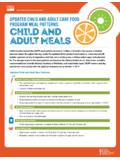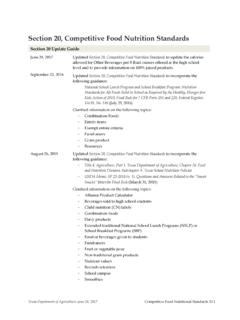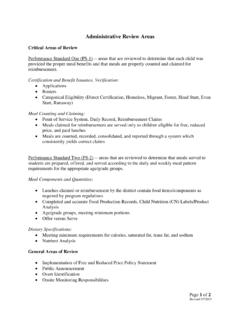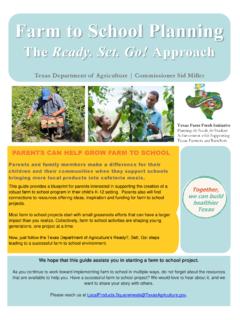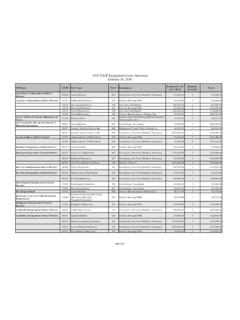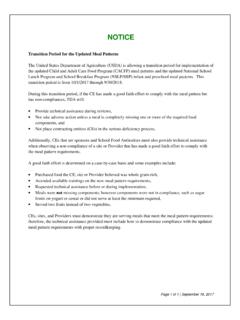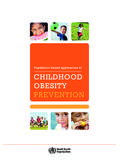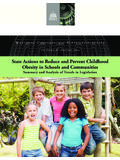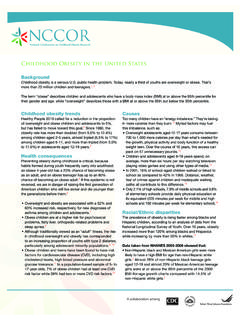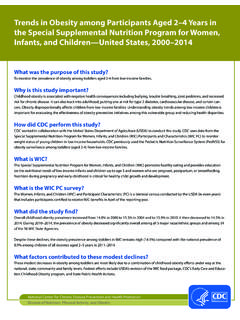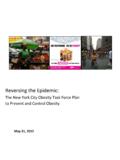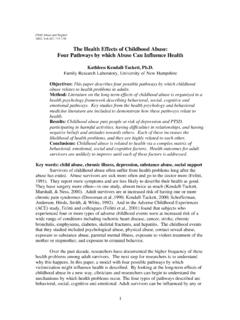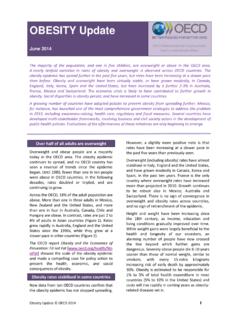Transcription of Report to the Texas Legislature - squaremeals
1 Report to the Texas Legislature The Early childhood Health and Nutrition Interagency Council November 1, 2014 Senate Bill 395 This Report was ordered by Senate Bill 395 of the 81st Regular Session of the Texas Legislature and represents a collaboration of these State Agencies 1 Report of the Early childhood Health and Nutrition Interagency Council Table of Contents Early childhood Health and Nutrition Interagency Council Members .. 2 Early childhood Health and Nutrition Interagency Council Stakeholders .. 2 Executive Summary .. 4 Introduction .. 5 childhood Health and Nutrition: Definitions .. 7 Actions Taken in Furtherance of the Six-Year Plan .. 11 Action A: Breast Milk and Breastfeeding .. 11 Actions Taken.
2 13 Action B: Increase Consumption of Fruits and Vegetables .. 26 Actions Taken .. 27 Action B: Food Brought from Home .. 33 Action C: Raise Nutrition Standards .. 35 Actions Taken B and C: Increase Physical Activity for Pre-School Children in Child Care .. 38 Actions Taken .. 40 Decreasing Malnutrition and Undernourishment among Children Under the Age of Six .. 43 Conclusion .. 46 Appendices and Sources .. 47 2 SB 395 Council Members Amy L. Williams, JD Institutional Outreach Liaison Healthy Policy and Clinical Services Health and Human Services Commission Christina Thi, MPH, RD, LD obesity Prevention Coordinator, Community and Worksite Wellness Program Health Promotion and Chronic Disease Prevention Section Texas Department of State Health Services Tracy Erickson, RD, IBCLC, WIC Breastfeeding Coordinator Texas Department of State Health Services Joseph Segovia Workforce Technical Assistance and Child Care Texas Workforce Commission Linda Simmons, MSHP, RD, LD Nutrition Specialist, Child and Adult Care Food Program Texas Department of Agriculture Howard Morrison Statewide Coordinator.
3 Early childhood Education Texas Education Agency Lee Roberts Child Care Licensing Division Department of Family and Protective Services Sharon Robinson, PhD, RD, LD Associate Professor and Extension Nutrition Specialist Texas A&M AgriLife Extension Service SB 395 Stakeholders Rhonda Lane MS, CNS Adjunct Instructor Austin Community College Expertise: Early childhood nutrition and physical activity Glenda Overfelt Head Start Director, Child Inc. Expertise: Managing of child care facilities Blake Stanford Owner Southwest Human Development Expertise: Managing child care facilities operated in a private residence 3 Arthi Krishnan, MD, FAAP Texas Pediatric Society obesity Committee Expertise: Pediatric health Stephen Pont, MD, MPH, FAAP Medical Director, Dell Children s Texas Center for the Prevention and Treatment of childhood obesity Expertise: Early childhood health Kim Updegrove, RN, CNM, MSN, MPH Executive Director, Mothers Milk Bank of Austin Expertise: Advance practice nurse Deanna M.
4 Hoelscher, PhD, RD, LD, CNS Director, Michael & Susan Dell Center for Advancement of Healthy Living Expertise: Community health education and outreach Margaret Briley, PhD, RD, LD Professor of Nutritional Sciences The University of Texas at Austin Expertise: Community health education and outreach 4 Executive Summary Background Senate Bill 395, passed during the 81st Regular Session of the Texas Legislature , created the Early childhood Health and Nutrition Interagency Council (the Council) to improve the health of Texas infants and children under the age of six. The Council was tasked with reviewing current research and making recommendations for improving the health of Texas children under the age of six.
5 The Council centralizes the efforts of Texas state agencies to combat childhood obesity and address malnutrition and undernourishment by involving children, parents, families, caretakers and communities. Issues Teaching the youngest Texans how to eat right and exercise and addressing barriers that prevent them from doing so will benefit the state far into the future. Children and adolescents who are obese or overweight can carry poor health and nutrition habits into adulthood. The future implications for physical inaction include a wide range of economic, social and political consequences. Today, forming good health habits at an early age means giving parents and child care providers the tools they need to feed children healthy meals and to incorporate exercise into their daily routines.
6 Improving infant health also means encouraging parents to make breast milk available to their children. A wide range of environmental factors can influence a child s risk for obesity in the first years of life. While important steps have been taken to reduce the incidence of obesity in the general population, many national efforts to prevent obesity overlook infants, toddlers and preschool children. Understanding the implications of that oversight and preventing its continuation is Texas has made great strides in educating parents and child care providers about the steps needed to improve health and nutrition for children under the age of six. Statewide initiatives, education efforts and research endeavors have improved nutrition and increased physical activity for many young Texans.
7 Despite considerable progress, barriers to realizing the Council s charge remain. The Council has updated the following recommendations to advance Texas efforts in improving early childhood health and nutrition. 2014 Recommendations of the Early childhood Health and Nutrition Interagency Council Provide statewide support and recognition of the Texas Mother-Friendly Worksite program that provides businesses with a written policy of support of breastfeeding for employees, including suitable accommodations and flexible scheduling for breastfeeding or milk expression. Provide statewide support of the Texas Ten Step Program that recognizes hospitals and birthing facilities that address 85 percent of the Ten Steps to Successful Breastfeeding and provide technical assistance to help facilitate earning the Baby Friendly designation.
8 Provide statewide support and implement a campaign to increase awareness of and access by eligible participants to nutrition assistance programs such as Child and Adult Care Food Program (CACFP), The Supplemental Nutrition Program for Women, Infants and Children (WIC) and Nutrition, Supplemental Nutrition Assistance Program (SNAP) and Supplemental Nutrition Assistance Program Education (SNAPEd) that provides guidance for improving nutrition and health in early childhood settings. 5 Align nutrition standards and meal patterns between CACFP and Texas Department of Family and Protective Services (DFPS) Child Care Licensing (CCL) for consistency and improved nutrient quality across all child care facilities preparing foods for infants and children under the age of six.
9 Continue efforts with DFPS CCL to include additional minimum physical activity standards in child care facilities for infants and children under the age of six. Provide support to the DFPS CCL in training child care providers on how to support breastfeeding duration and exclusivity in child care facilities and improve DFPS CCL minimum standards for breastfeeding supportive child care practices. Provide child care facilities, children and parents with information on Farm to Child Care (FTC) which is similar to the established Farm to School model that helps to establish: connections with local farmers, purchasing local fruits and vegetables, integrating more fresh fruits and vegetables into meals and snacks, consumption of fresh produce, children participating in the food system and growing child care gardens.
10 Determine a system for assessing and monitoring physical activity trends using The Child Care Centers/Homes Physical Activity Self-Assessment Survey in child care settings for infants and children under 6 years of age to establish baseline data for: number of minutes of structured and unstructured physical activity, frequency and duration of screen time, and barriers to physical activity. Introduction Texas Senate Bill 395, introduced by Senator Eddie Lucio, Jr., and Representative Eddie Lucio, III, during the 81st Texas Legislature called for the creation of a council to improve the health of Texas infants and children under the age of six by addressing the nutrition and physical activity practices in early childhood care settings.
